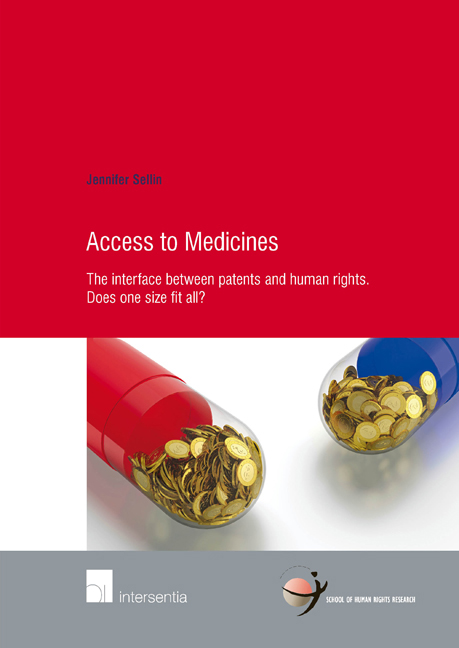Book contents
- Frontmatter
- Dedication
- Acknowledgements
- Contents
- List of Abbreviations
- Part I Method and Problem Statement
- Part II International Framework
- Part III Country Studies
- Chapter 6 Access to Medicines in South Africa
- Chapter 7 Access to Medicines in India
- Chapter 8 Access to Medicines in Uganda
- Chapter 9 Findings, Conclusions and Recommendations
- Bibliography
- Curriculum Vitae
- Miscellaneous Endmatter
Chapter 9 - Findings, Conclusions and Recommendations
from Part III - Country Studies
Published online by Cambridge University Press: 22 November 2017
- Frontmatter
- Dedication
- Acknowledgements
- Contents
- List of Abbreviations
- Part I Method and Problem Statement
- Part II International Framework
- Part III Country Studies
- Chapter 6 Access to Medicines in South Africa
- Chapter 7 Access to Medicines in India
- Chapter 8 Access to Medicines in Uganda
- Chapter 9 Findings, Conclusions and Recommendations
- Bibliography
- Curriculum Vitae
- Miscellaneous Endmatter
Summary
PATENTS – ACCESS: INTERFERENCE
Poor patients worldwide continue to face difficulties in obtaining or purchasing essential medicines because of scarce availability and high prices. The focus of this research is the interface between patent and human rights law with regard to access to essential medicines in the context of developing countries. The argument often made in that regard is that patents negatively impact patients’ access to medicines as patent protection for medicines results in higher prices. Therefore, before turning to the examination of the relationship of patent protection for medicines and access to such medicines, a preliminary question had to be asked:
Does patent protection for medicines interfere with patients’ access to essential medicines?
Access in the context of this research entails that medicines are available, physically accessible and affordable on a non-discriminatory basis (in addition to being culturally acceptable and of good quality). The focus here is on the element of “affordability” of essential medicines within a developing country context. Namely, for (developing) countries operating in a resource constrained setting it is a continuous struggle to find and allocate the resources necessary to maintain and improve the public health care system and, as a result of inadequate public health systems, many patients in developing countries are forced to privately finance medicine use. Moreover, it is especially developing countries with poor public health systems which suffer disproportionately from widespread public health problems such as HIV/AIDS, tuberculosis and malaria and a systematic lack of access to affordable medicines. It is therefore crucial that developing countries ensure that medicine prices are as low as is realistically possible.
Both economic theory (the fact that patent protection in the majority of situations leads to a monopoly position) and a number of empirical studies find that in general patent protection for medicines go hand-in-hand with higher medicine prices. Consequently, patent protection for medicines may interfere with access to such medicines. These higher prices are then argued, particularly by the pharmaceutical industry, to be justified due to the fact that patents are essential in order to enable pharmaceutical corporations to recoup their substantial research and development costs; without patent protection companies would have no incentive to invest in innovation.
- Type
- Chapter
- Information
- Access to MedicinesThe Interface between Patents and Human Rights. Does one size fit all?, pp. 437 - 460Publisher: IntersentiaPrint publication year: 2014



